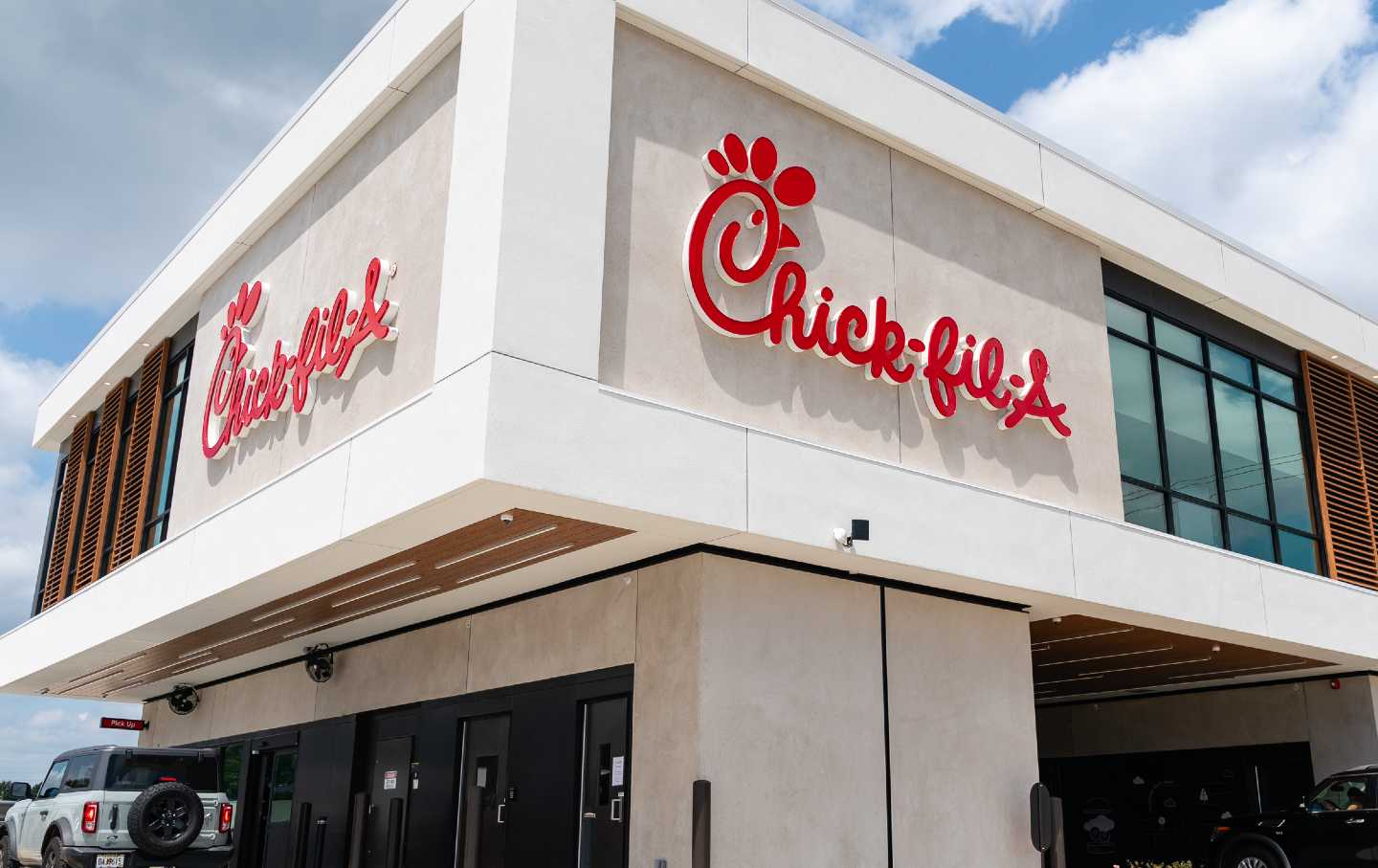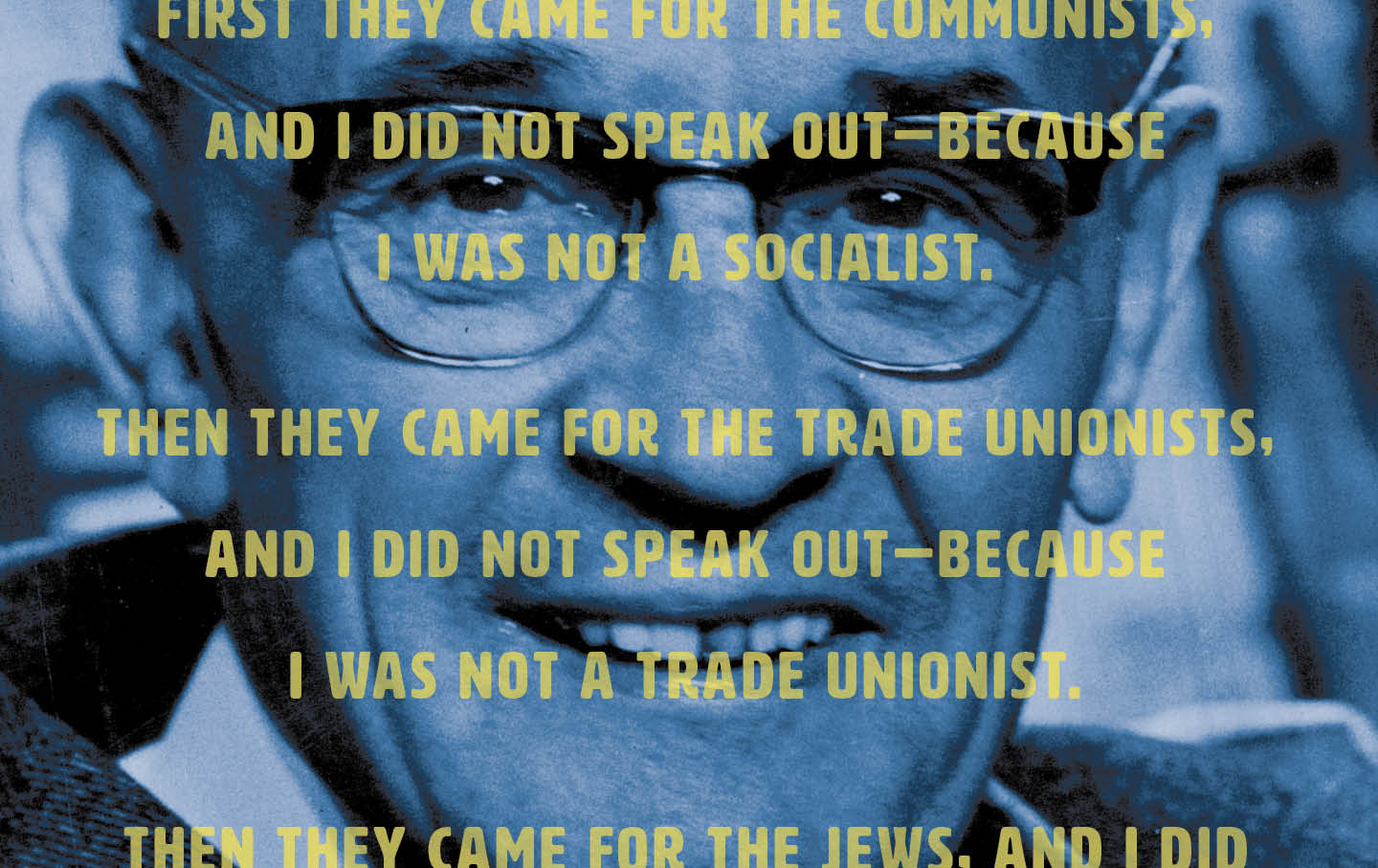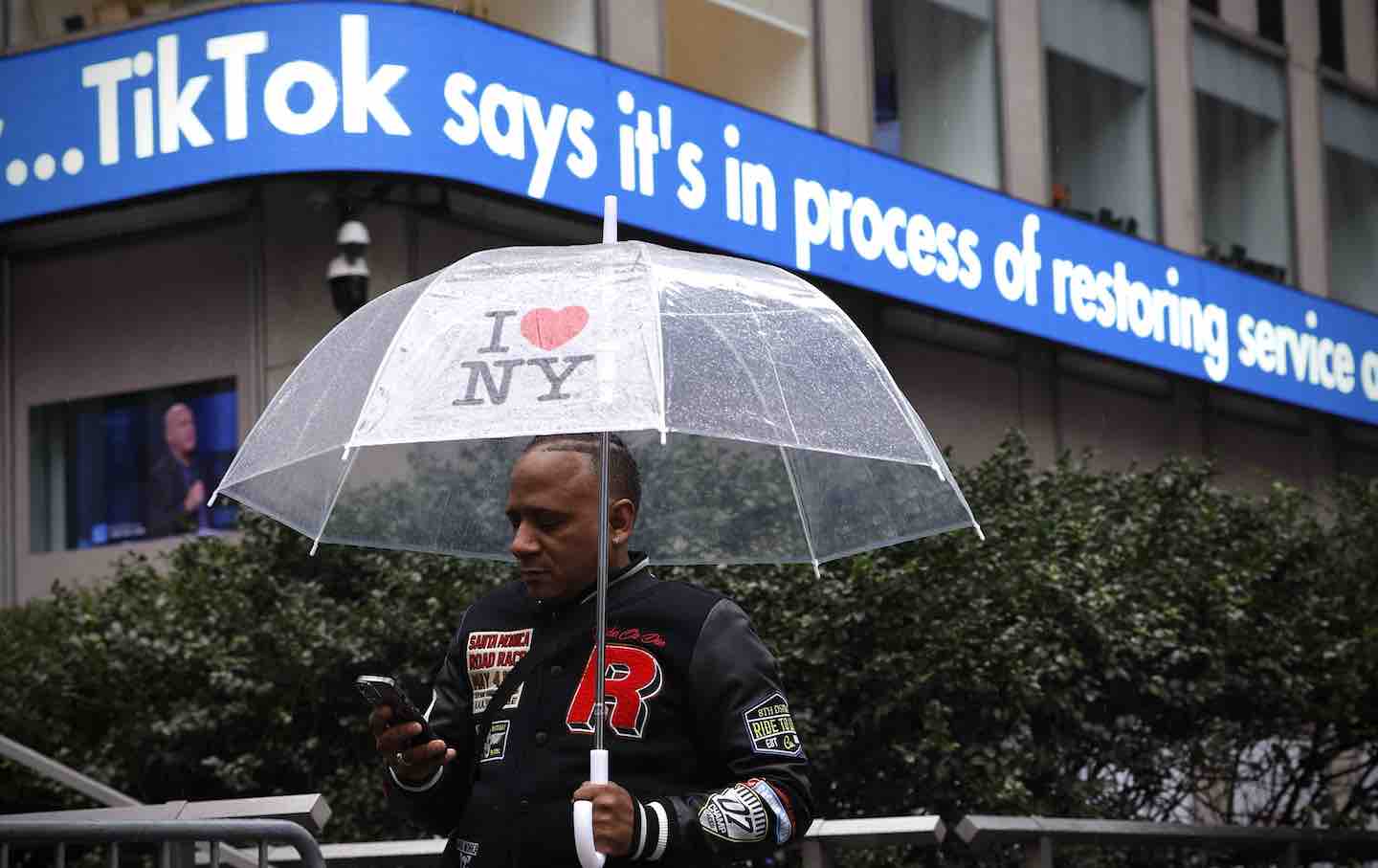Move Over Hollywood, Here Comes Chick-fil-A
The fast-food giant is poised to move the entertainment world further to the right.

Recently, the entertainment industry news site Deadline broke the news that fast-food giant Chick-fil-A had approved an “aggressive” entry into the entertainment industry as a producer of reality-TV and game-show programming. Eventually, Deadline reported, Chick-fil-A may launch its own branded streaming platform.
The always-closed-on-Sunday chain, home of the honey pepper pimento chicken sandwich, is reportedly in talks to acquire and license programming, and has an eye on possibly producing scripted entertainment—sitcoms, feature films, and the like. For original programming, it has already approached several major production companies, including game-show producer Glassman Media and film producer Michael Sugar (who won an Oscar for his work on Spotlight in 2015). Whatever the Chick-fil-A team is doing, it’s serious. And all of this new work, Deadline reports, will be “family-friendly” entertainment.
Chick-fil-A already produces animated shorts on its website and the Pennycake brand of kids’ games—a less-goofy version of McDonald’s McDonaldland play areas and toys. In the streaming age of Apple+ and Amazon, it’s nothing new to see corporations from outside the industry taking an active role in production and distribution of entertainment. The home-electronics concern Sony has owned Columbia Pictures since 1989, after purchasing it from Coca-Cola, which had owned the studio since 1982. Nor does the control of a non-entertainment corporation belie good work. Apple+ produces Slow Horses and bankrolled Martin Scorsese’s Killers of the Flower Moon, which garnered 10 Oscar nominations. Long ago, the Gulf + Western oil corporation owned Paramount, and its movie-fan owner Charlie Bluhdorn became a key figure in the New Hollywood of the 1970s by backing major studio projects like The Godfather and Chinatown.
What sets Chick-fil-A’s entry into show business apart is the polarizing religious politics of its owner, Dan Cathy. Yes, Tim Cook’s, Jeff Bezos’s, and David Zaslav’s respective companies draw frequent and justified criticism for labor, tax, and creative issues, but their top executives’ personal politics and cultural views rarely make headlines. Since 2012, Cathy has been a vocal opponent of LGBTQ rights and same-sex marriage. That year, he made his stance public and turned his bland chicken sandwich business into a right-wing front in the culture wars. “We are very much supportive of the family—the biblical definition of the family unit,” he said. “We are a family-owned business, a family-led business, and we are married to our first wives. We give God thanks for that.”
Overnight, Cathy rebranded Chick-fil-A into Church-fil-A and made buying a sandwich at his restaurants a divisive political and cultural choice for his customers. When you just want lunch, who needs that? Chick-fil-A found itself subject to a loud but failed boycott and same-sex kissing events outside its restaurant. The boycott foundered in part because cultural conservatives like then–Arkansas Governor Mike Huckabee rallied against it, but it effectively made the company a symbol of intolerance to many. Dan Cathy is entitled to his religious views, but it also came out that Chick-fil-A gave money to religious groups with anti-LGBTQ histories, such as the Fellowship of Christian Athletes and the Salvation Army.
In 2013, the Supreme Court struck down Article 3 of the Defense of Marriage Act, and declared it unconstitutional for the federal government to discriminate against same-sex married couples. In response, Cathy tweeted, “Sad day for our nation; founding fathers would be ashamed of our gen. to abandon wisdom of the ages re: cornerstone of strong societies.”
Cathy later took the tweet down, but it’s rare to find a modern-day CEO who publicly embraces discrimination. The mayors of Chicago, Boston, and San Francisco, among others, publicly asked his company not to set up shop in their towns. And that’s what makes Chick-fil-A’s bold and surprising leap into pop culture with a promise of “family-friendly” programming a charged proposition. For most of us, family programming means watching Elf every year at Christmas or reruns of The Andy Griffith Show. For the Dan Cathys of the world, the word “family” takes on a loaded, partisan, religious, and exclusionary tone. While Chick-fil-A has backed off on donations to anti-LGBTQ groups in recent years, Cathy himself has never publicly reversed his stance. He’s simply gone silent on the subject of just who and what he considers an actual family.
Cathy has the right to his religious beliefs, of course, but Chick-fil-A’s looming debut in the entertainment industry comes at a time when extremely regressive, right-wing pop culture is rapidly expanding into the mainstream. Dave Chappelle’s stand-up specials are unapologetically anti-trans. J.K. Rowling has transformed from a beloved family friendly children’s novelist, with a Harry Potter streaming series in development, into a social media bête noire of trans-hate. Ben Shapiro’s Daily Wire backs a humor-resistant animated half-hour starring Adam Carolla, Mr. Birchum. “I’m a heteronormative cis-gender white male,” says one effeminate character who wears a man-bun and has a lisp. “For which I apologize.” “I’m Black,” says another, “And that used to be enough. Now I’m bilingual and nonbinary.” The jokes have the tiresome “Oh, are you offended?” air of bad DEI tweets come to life.
Now in its second season, Mr. Birchum boasts a cast that includes the familiar Hollywood voices of Carolla, Patrick Warburton, Danny Trejo, and—despite everything—MAGA and QAnon enthusiast Roseanne Barr. It also includes right-wing media personalities like Santa Claus Truther Megyn Kelly and ex-ESPN vax-skeptic Sage Steele (who replaced the more-than-Nazi-curious Candace Owens). Steele lost her ESPN job over her vax comments and deep thoughts on why Barack Obama identifies as Black when he was raised by his white mother.
Why should anyone producing a putative comedy rely on such shrilly non-comic talent like Kelly, Owens, or Steele? The short answer is that Mr. Birchum is devoted less to entertainment than to ideological titillation. It hopes to exploit each of the established political audience attached to the right-wing influencers on its case—audiences often bigger than those claimed by actual comedians. Hollywood of old had lots of odious conservative culture, but you didn’t see John Wayne starring in movies with Joe McCarthy. The late Andrew Brietbart, founder of Breitbart News, liked to say, “Politics is downstream from culture.” If you can shape the culture, the thinking on the MAGA right goes, it becomes easier to shape actual politics.
On movie screens last summer, the Q-Anon-adjacent child-trafficking thriller Sound of Freedom took the industry by surprise as a staggering hit. It stars Jim Caviezel, who played Jesus in Mel Gibson’s The Passion of the Christ, as the now-disgraced anti-trafficking crusader Tim Ballard. Ballard, former CEO of Operation Underground Railroad (OUR), denies that he subscribes to QAnon beliefs, but in an interview with Jordan Peterson claimed to have raided a West African baby factory where children’s organs were harvested for Satanic ritual abuse. Then, after a raft of sexual misconduct claims, OUR forced Ballard out of his own anti-predator organization as a suspected predator, accusations he still denies and fights.
Caviezel, also a right-wing conspiracy theorist, has called Donald Trump “the new Moses” and has indicated his own belief in QAnon theories like “andrenochroming,” which posits that child traffickers drain the blood of their young victims for an elixir of youth—an ugly myth rooted in the ancient antisemitic blood libel. The film’s writer director, Alejandro Monteverde, publicly distanced himself from Caviezel over the actor’s comments, arguing that his star’s QAnon views hurt his movie.
And yet, all that Q talk ran parallel to the film’s rollout, including a screening of Sound of Freedom with Trump at his Bedminster, New Jersey, golf club and family plot. The movie itself may not actively promote Q, but the press tour certainly did. In Caviezel, Q adherents finally had a Hollywood movie star with several legit box office hits to his credit endorsing their conspiracy theories (instead of turning up at the center of them) in a paranoid child-trafficking thriller. It’s a strategy similar to last summer’s Jason Aldean hit song, “Try That in a Small Town.” The song itself came across as innocuous and apolitical; but the incendiary video that accompanied it turned it into a MAGA hit.
As Q’s legions like to say, “Where we go one, we go all,” and that includes the multiplex. Some question Sound of Freedom’s actual box office numbers, but in March 2024 Deadline cited its global receipts at $249.5 million from a $14.5 million budget. Some $184 million of that total came from North America alone. In today’s increasingly rightward pop-political culture, Q didn’t hurt the movie—indeed, it’s arguably what made Sound of Freedom a global hit. This week, Francis Coppola began the rollout of his long-awaited Megalopolis, hitting similar right-leaning notes. “What I didn’t want to happen is that we’re deemed some woke Hollywood production that’s simply lecturing viewers,” he said. “The cast features people who were canceled at one point or another.”
Casting “canceled” actors and anti-wokeness as a marketing plan? Has Coppola suddenly gone weird right? Highly doubtful. Does he understand the need to appeal to that MAGA demographic in today’s market? Yes, he clearly does.
Deadline’s story also noted that Chick-fil-A may be launching a streaming platform. That prospect underlines another regressive turn in Hollywood: streaming studios backed by non-entertainment concerns that undermine the hard-won gains of the entertainment industry’s unions. Currently, Chick-Fil-A restaurant workers do not have a union, and in 2019, the Labor Tribune of St. Louis and Southern Illinois reported that the chain had been added to the “Do Not Patronize” list for several major unions. Local union representatives reported that Chick-fil-A at first indicated it would hire local organized workers to build its restaurants—and then proceeded to hire low-wage non-union workers from out of state.
That history does not bode well for Chick-fil-A as a streamer. Yes, a new round of well-funded projects featuring scripted content would mean more work for union members in Hollywood. At the same time, introducing another nontraditional management partner that’s only partially invested in entertainment will only further complicate future collective bargaining agreements. The bosses from outside the industry reportedly emerged as the true hard-liners in last year’s historic Hollywood strikes. As the Writers Guild of America and Screen Actors Guild strikes wore on, the WGA announced in September 2023 that after four months, a rift had appeared in the Alliance of Motion Picture and Television Producers (AMPTP), the producers’ collective voice in dealings with unions. (For its part, the AMPTP denied that any such schism existed.)
The rift the WGA saw concerned the divergent approaches of “legacy studios”—classic outfits such as Warner Bros., Paramount, and Disney—and the newer streaming studios, like Amazon, Netflix, and Apple+. The legacy studios, whose main business is entertainment, needed to reach an agreement with striking workers more than the new streaming giants did. Amazon and Apple+ don’t bring in the majority of their revenue on TV and movies. Amazon’s monopoly stake in online retail, together with Apple’s global dominance in the phone and computer markets, severely diminishes a Hollywood union’s leverage with them—meaning they feel empowered as producers to treat industry workers as they do their own underrepresented international work forces.
Striking workers got that message loud and clear last year as negotiations with studios dragged on, knowing that producers like Apple, Netflix, and Amazon could sit back in labor disputes and wait seemingly forever. The old-school studios don’t have that luxury. Chick-fil-A falls into that new category; its bosses can sell honey pepper pimento combos for months on end to wait out a union.
Chick-fil-A has made billions wrapping its sandwiches in a selective notion of family values. As it moves into the entertainment industry and promises family-friendly entertainment, it needs to make clear that it intends such fare to be friendly to everyone’s family. That inclusive brand of friendship also means paying real family wages to its own creative partners.








